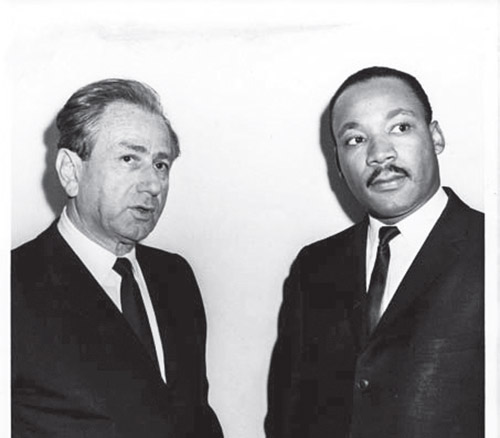

If any Jewish leader in modern times exemplifies the clarion call of opposition to both the Nazis’ attempted annihilation of world Jewry and the rabid discrimination and bigotry against blacks in America, it was Rabbi Joachim Prinz. This year, the commemoration of Martin Luther King Jr.’s birthday and International Holocaust Remembrance Day fall within the same calendar week. This timely juxtaposition underlies the upcoming joint program of the Northern New Jersey Holocaust Memorial and Education Committee and the Enslaved African Memorial Committee.
On Sunday, January 27, at 2 p.m., in the auditorium of the Teaneck Library, the award-winning film “I Shall Not Be Silent” will be aired for the community. The film explores the turbulent life of German-born Rabbi Joachim Prinz who in one lifetime took on the giant enemies of the 20th century: bigotry and scapegoating.
Steve Fox, co-chair of the NNJHMEC, offered, “The merging of these two anniversaries is emblematic of what we are trying to do on the Teaneck Municipal Green. Each group is currently raising funds to create memorials and educational centers whose synergy will allow those visiting the Holocaust and Education Center to walk across the Green and visit the Enslaved Memorial and vice versa. We believe that the groups share common messages of tolerance and respect for others and that learning about the atrocities that each group has suffered will give visitors a greater appreciation of what happens when fascism and tyranny reign.”
The film “I Shall Not Be Silent” was produced in 2014 and has been cited as the Official Selection of the Jewish Film Festival in Berlin, the Jerusalem International Film Festival and the Toronto Jewish Film Festival as well as film festivals in Australia, England and across America.
The film begins in Berlin in the 1930s when Nazism was revving up. The young Rabbi Prinz refused to remain silent as Jews were being systematically stripped of their civil rights. Prinz set out to restore the self-esteem of the German Jews, some of whom were in denial of the ever-increasing anti-Jewish measures. Despite his awareness that the Nazis were monitoring his every word, Rabbi Prinz continued to preach about the value of Judaism and suffered several jail terms. Through his powerful preaching he saved many German Jews by encouraging them to emigrate.
In 1937, Prinz and his young family were expelled from Germany. Upon their arrival in the U.S., the land where democracy had supposedly triumphed over bigotry and hatred, Prinz was appalled at the open racism being directed against black Americans and soon realized that his American ideal left much to be praised.
From his pulpit at the prominent Temple B’nai Abraham in Newark, New Jersey, Prinz preached fairness and equality for all citizens of the U.S. to large audiences. Through his many positions within the larger Jewish community, including his term as president of the American Jewish Congress, Prinz soon became regarded as a leader of the civil rights movement. He helped organize the historic March on Washington in March of 1963. There he preceded the famous Martin Luther King Jr.’s “I Have a Dream” speech with these words: “Bigotry and hatred are not the most urgent problem. The most urgent, the most disgraceful, the most shameful and the most tragic problem is silence.”
The showing of the inspirational film “I Shall Not Be Silent” will be followed by a Q&A session with the two producers of the film, Rachel Fisher and Rachel Pasternack. They are also the producers of the film “Remembering Oswiecim,” which aired for a number of years numerous times daily at the Auschwitz Jewish Center in Oswiecim, Poland.
Rachel Fisher earned her PhD in religious studies from the University of California, Santa Barbara. She served as the founding director of the Genealogy Institute at the Center for Jewish History in NYC where she developed the Samberg Family History Program. Rachel Pasternak holds a master’s degree in Jewish studies from the Jewish Theological Seminary. While pursuing her graduate studies, Pasternak obtained access to Rabbi Joachim Prinz’s private archives and wrote one of the first academic papers on his life and career. She was additionally motivated by the close relationship of her grandparents who were congregants and great admirers of Rabbi Prinz.
Fisher and Pasternak were brought together during their graduate school days by their mutual interest in oral histories. They collaborated on the Auschwitz film in 1999 and then rejoined in 2007, after starting their families, to collaborate on the Prinz project, which took them seven years to complete. They are most gratified that they have given a name and face to a “heroic” Jewish figure who was mostly ignored in the accounts of Jewish history of the last century.
Pasternak is gratified that the film “I Shall Not Be Silent” will be shown this Sunday “at a venue that closely reflects Prinz’s life’s work of educating diverse communities about the history and culture of other groups in an effort to bring them together in mutual respect and understanding.” Fisher commented that in addition to his rabbinical studies, Prinz obtained a PhD in art history and was very interested in public art. “He felt that edifices are expressions of what communities want to convey. When his own synagogue was relocated to Livingston, New Jersey, Prinz insisted that the windows be clear, not stained glass, so that the parishioners could view nature during their prayers.”
The community is invited to attend the showing of “Joachim Prinz: I Shall Not Be Silent” on Sunday, January 27, at the Teaneck Public Library on Teaneck Road off Cedar Lane at 2 p.m. in the lower-level auditorium.
For more information on the proposed memorials, please go to eamc.org and nnjholocaustmemorial.org.�
By Pearl Markovitz










